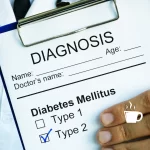Physical Address
304 North Cardinal St.
Dorchester Center, MA 02124
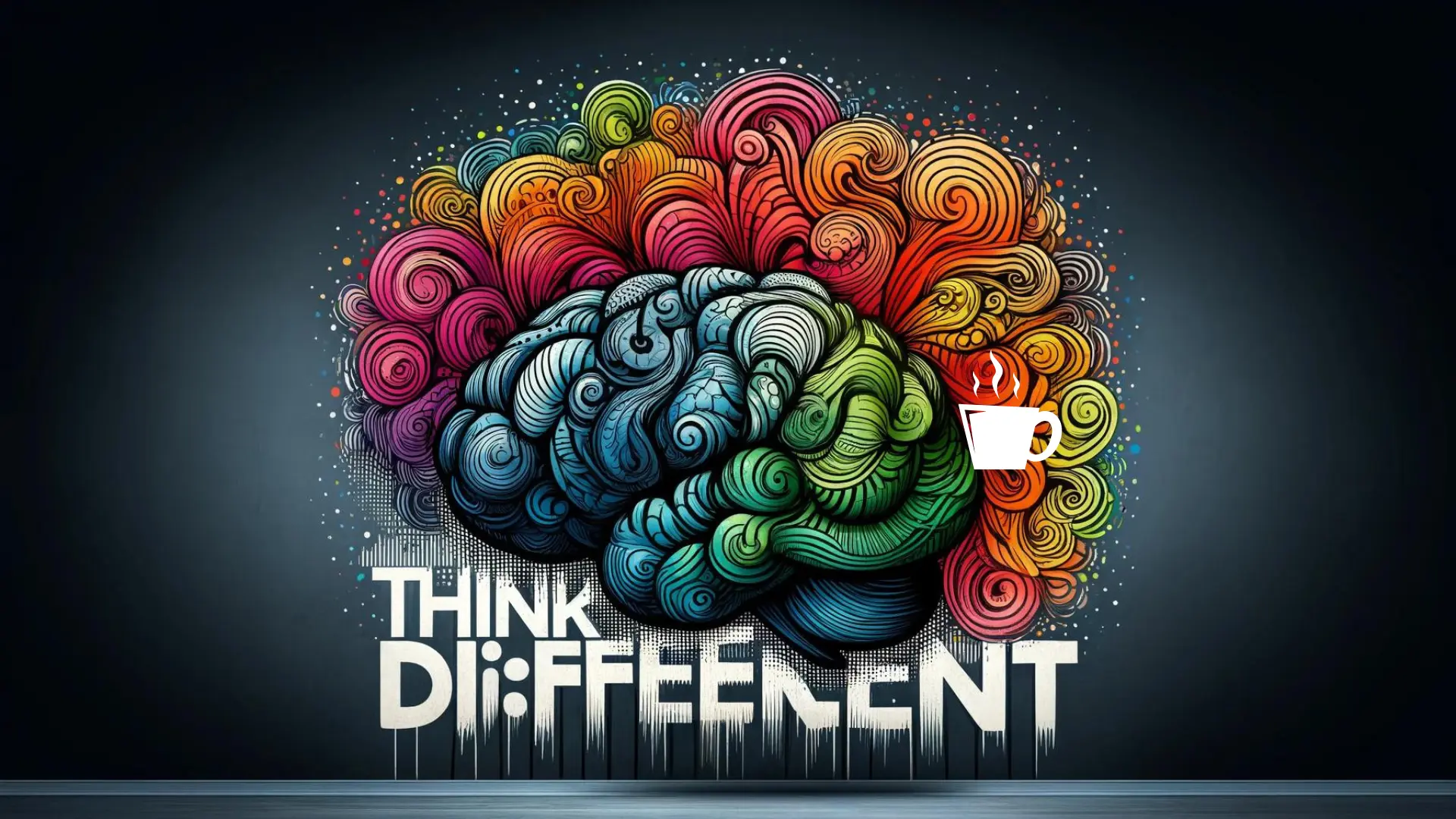
In recent years, the dialogue around mental health has increasingly embraced alternative treatments, with CBD (cannabidiol) emerging as a prominent contender. Known for its potential to soothe without the psychoactive effects of its cousin THC, CBD has garnered attention for its possible benefits in anxiety management. This interest sparks a critical question: Is CBD a groundbreaking solution for anxiety, or is it encased in a bubble of hype?
As we delve into this topic, it’s essential to explore CBD’s interaction with anxiety through a lens of scientific research and anecdotal evidence. Understanding CBD’s role could illuminate new pathways for those seeking relief from anxiety, offering hope amidst the skepticism.

Cannabidiol, or CBD, has captured the interest of the medical community and the public alike as a non-intoxicating compound found in cannabis. Unlike THC, the well-known psychoactive counterpart found in the same plant, CBD does not cause a high. This distinction is crucial for individuals seeking the therapeutic benefits of cannabis without the psychoactive effects that can interfere with daily activities. CBD’s legal status varies across the globe, but many regions have recognized its potential and have begun to legalize it for medical and recreational use.
The extraction of CBD from the cannabis plant is a sophisticated process, resulting in various forms of the compound, such as oils, tinctures, edibles, and capsules. This versatility allows individuals to choose the method of consumption that best suits their preferences and needs. For those wary of ingesting the compound, topical creams and lotions containing CBD offer an alternative method of delivery, highlighting the compound’s flexibility in application.
CBD’s rise in popularity is largely due to its wide range of purported health benefits, including its potential to alleviate conditions such as chronic pain, inflammation, and, notably, anxiety. The compound’s interaction with the body’s endocannabinoid system is thought to play a key role in its therapeutic effects. This system, present in all mammals, regulates various physiological responses, including stress, sleep, and immune function, making CBD’s influence on it particularly relevant for those with anxiety.
However, despite the growing anecdotal evidence supporting CBD’s effectiveness in treating anxiety, the scientific community calls for more rigorous research. Early studies are promising but highlight the need for further exploration into how CBD exerts its anxiolytic effects at a molecular level.
Understanding the intricacies of CBD’s impact on anxiety requires a multidisciplinary approach, combining insights from pharmacology, psychology, and neuroscience. As research progresses, it is hoped that clearer guidelines on dosages, delivery methods, and contraindications will emerge, allowing for the safe and effective use of CBD in managing anxiety. This endeavor not only promises to deepen our understanding of CBD but also to offer new avenues for treatment to those struggling with anxiety in an increasingly stressful world.
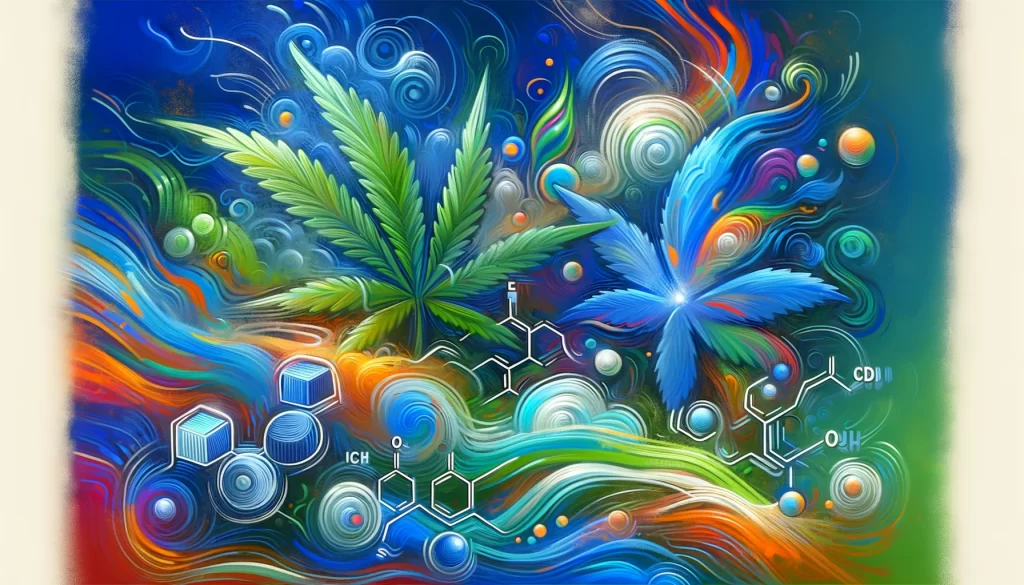
CBD’s mechanism for alleviating anxiety hinges on its interaction with the body’s endocannabinoid system (ECS), a complex network of receptors that regulate various bodily functions, including mood, sleep, appetite, and stress responses. The ECS plays a crucial role in maintaining homeostasis, or balance, within the body, making its proper functioning essential for overall health and well-being. CBD is thought to interact with this system by influencing receptors that control serotonin levels, a key neurotransmitter involved in mood regulation.
Serotonin receptors, notably the 5-HT1A receptor, are critical in the management of anxiety. By modulating these receptors, CBD can potentially enhance serotonin signaling, which is often impaired in individuals suffering from anxiety. This interaction is similar to the way selective serotonin reuptake inhibitors (SSRIs), common antidepressants, work to treat anxiety and depression. Therefore, CBD’s ability to affect the ECS without the psychoactive effects associated with THC makes it an attractive alternative for those seeking relief from anxiety symptoms.
Moreover, research indicates that CBD might also help reduce anxiety by diminishing physiological responses to stress, such as elevated heart rate and cortisol levels, which are common physical symptoms associated with anxiety disorders. This calming effect on the nervous system can provide a more stable baseline from which one can better manage stressors that trigger anxiety.
While the exact pathways through which CBD exerts its anxiolytic effects are still under investigation, animal studies have provided insight into its potential to reduce anxiety-like behavior. These studies often show CBD reducing behaviors typical of anxiety in stressful situations, suggesting a direct impact on stress-response mechanisms.
Ultimately, although the potential of CBD for anxiety looks promising, the scientific community continues to stress the need for more comprehensive human studies to confirm these effects. Understanding the nuances of how CBD interacts with the ECS will not only enhance its effectiveness as an anxiety treatment but also improve our broader understanding of how the ECS contributes to mental health conditions like anxiety.
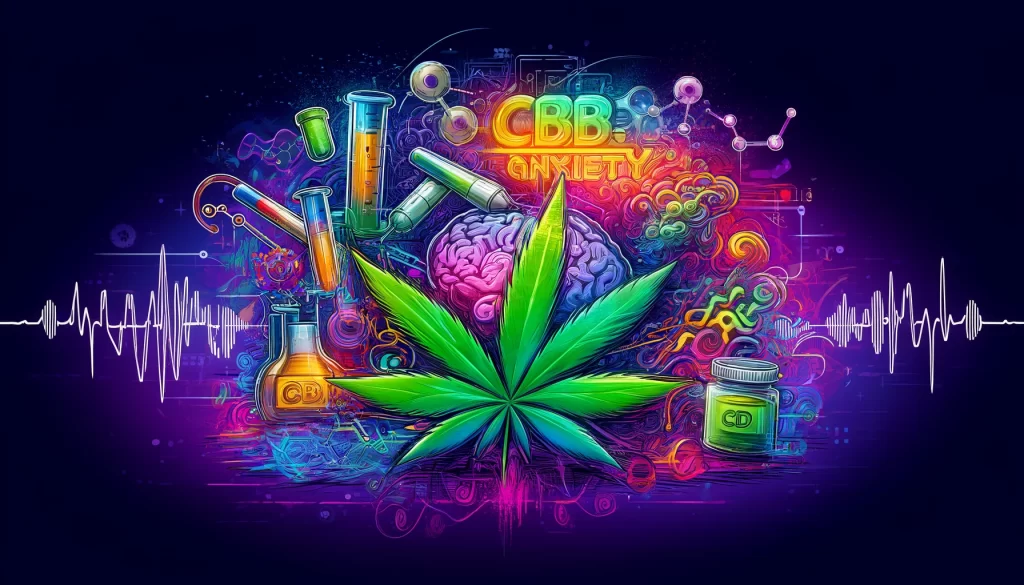
The research surrounding CBD’s effectiveness for treating anxiety is both extensive and promising, though still evolving. A pivotal 2015 review by researchers from the
University of São Paulo in Brazil and King’s College in London provided a substantial basis for CBD as a treatment for numerous anxiety disorders. The study analyzed existing literature on CBD and concluded that it demonstrated potential efficacy for generalized anxiety disorder, panic disorder, social anxiety disorder, obsessive-compulsive disorder, and post-traumatic stress disorder.
Further building on this foundation, a 2019 study specifically targeted social anxiety disorder in teenagers, a group particularly susceptible to anxiety issues. This study found that CBD significantly reduced anxiety levels, as measured by both physiological and self-reported indicators. The results encouraged further exploration into age-specific applications of CBD for anxiety, highlighting the need for tailored approaches in pediatric populations.
However, not all studies have reported uniform success. Some research has pointed to variability in results, which could be attributed to differences in CBD dosages, individual biochemistry, or the severity of anxiety symptoms. This suggests that while CBD can be effective, its impact may vary from person to person, underlining the importance of personalized treatment plans.
Moreover, long-term studies are scant, and more research is needed to understand the long-term effects and safety of routine CBD use. Most existing studies have focused on short-term outcomes, leaving questions about the potential impacts of long-term use and effectiveness over time unanswered.
In summary, the research into CBD as a treatment for anxiety is promising but still in its infancy. Continued studies are essential to fully understand its therapeutic potential and to establish standardized guidelines for its use in clinical settings. This will ensure that those seeking to manage anxiety can do so with a well-informed, evidence-based approach.
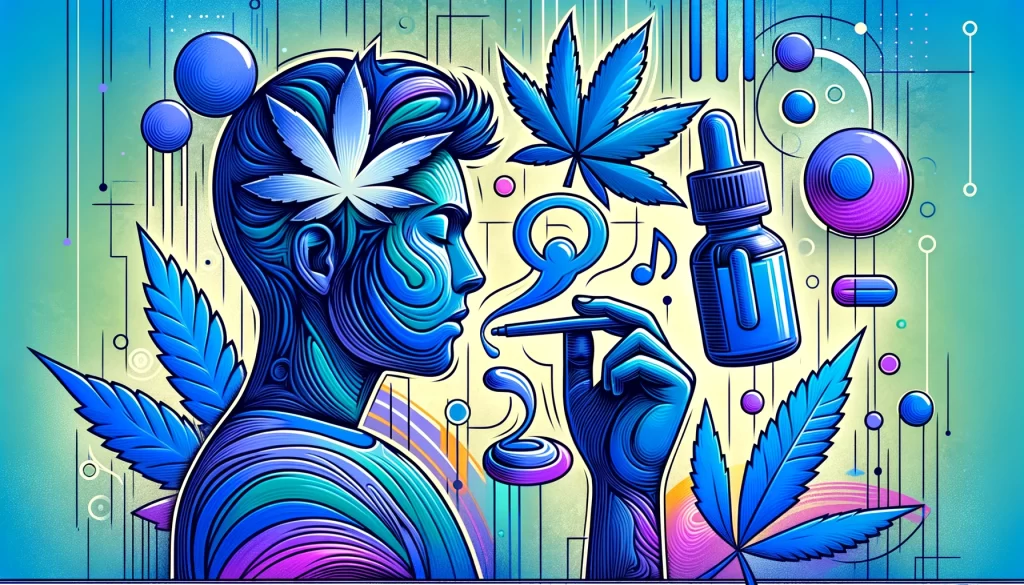
For individuals considering CBD as a treatment for anxiety, understanding how to properly use this compound is crucial. As with any alternative treatment, consulting with a healthcare provider before starting CBD is essential, especially for those currently taking other medications, to avoid unwanted interactions. Additionally, understanding the various forms of CBD available can help in selecting the most appropriate method for individual needs.
CBD is available in several formats, including oils, tinctures, capsules, and edibles. Each form has its own advantages and absorption rates. For instance, CBD oils and tinctures are popular due to their fast absorption when placed under the tongue. This method allows CBD to enter the bloodstream more quickly, potentially offering quicker relief from anxiety symptoms. Conversely, capsules and edibles provide a slower onset of effects but typically offer longer-lasting relief.
Determining the correct dosage of CBD can be challenging, as it varies based on individual factors such as body weight, the severity of the anxiety, and the concentration of CBD in the product. Starting with a low dosage and gradually increasing it is a commonly recommended approach. This method allows the individual to monitor the effects and adjust the dosage as needed, reducing the likelihood of experiencing side effects.
Monitoring the effects of CBD is an ongoing process. Users should take note of any changes in their anxiety symptoms and any side effects. Keeping a diary can be helpful in tracking the effectiveness of the dosage and any changes that might be necessary.
Lastly, it is important to remember that while CBD might help alleviate anxiety symptoms, it should ideally be part of a broader treatment strategy. This strategy could include therapy, lifestyle changes, and other medications, as directed by healthcare professionals. Integrating CBD with a comprehensive approach to anxiety can enhance overall treatment outcomes and ensure a more balanced approach to mental health.
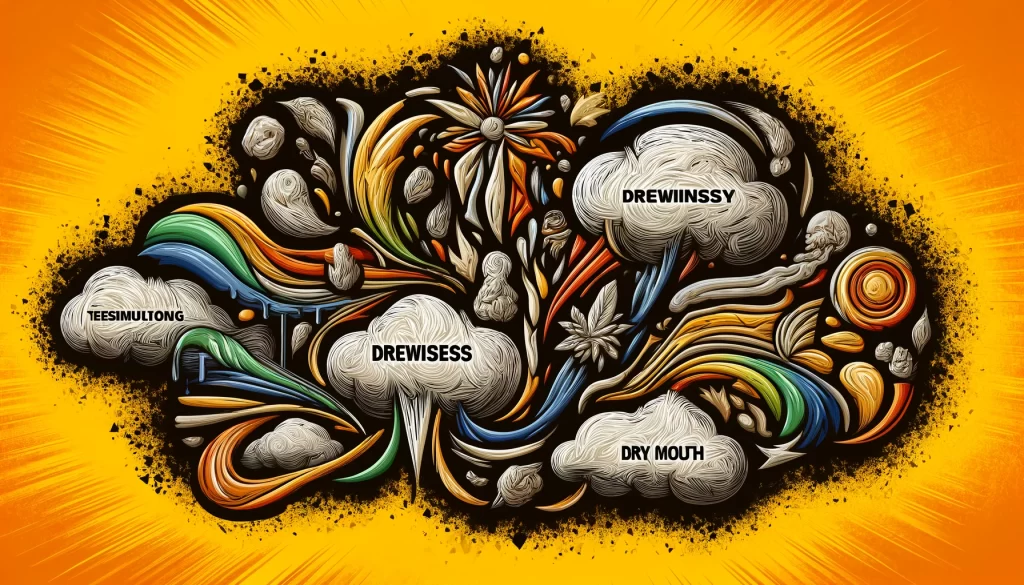
While CBD is generally considered safe and well-tolerated, it’s not without potential side effects. These side effects are typically mild but can include symptoms such as drowsiness, dry mouth, and in some cases, gastrointestinal discomfort or changes in appetite. Understanding these potential reactions can help users anticipate and manage them effectively, ensuring a more positive experience when using CBD for anxiety.
Drowsiness, one of the more common side effects, is particularly noteworthy for those who may need to drive or operate machinery. This effect, while often mild, underscores the importance of timing and dosing when using CBD, especially initially. Monitoring how CBD affects alertness can help users adjust their dosages accordingly to mitigate any undue impact on daily activities.
Dry mouth, another side effect, can often be managed with simple remedies such as staying hydrated. This symptom arises because CBD can influence the salivary glands, reducing saliva production. Regular fluid intake can help alleviate discomfort, maintaining oral health while using CBD.
For some individuals, gastrointestinal issues such as nausea or slight changes in appetite may occur. These symptoms are usually transient and can often be managed by adjusting the form or timing of CBD intake. If such symptoms persist, consulting with a healthcare provider is advisable to ensure there are no underlying issues or needed adjustments to other medications.
Lastly, it is crucial to consider the interaction of CBD with other medications. CBD can affect the metabolism of certain drugs, much like grapefruit juice does, by inhibiting certain enzymes in the liver. This interaction can lead to higher levels of other drugs in the system, potentially leading to adverse effects. This makes it essential for individuals to consult healthcare providers about all medications they are taking before starting CBD. This step ensures safety and efficacy in managing anxiety with CBD as part of a broader treatment plan.
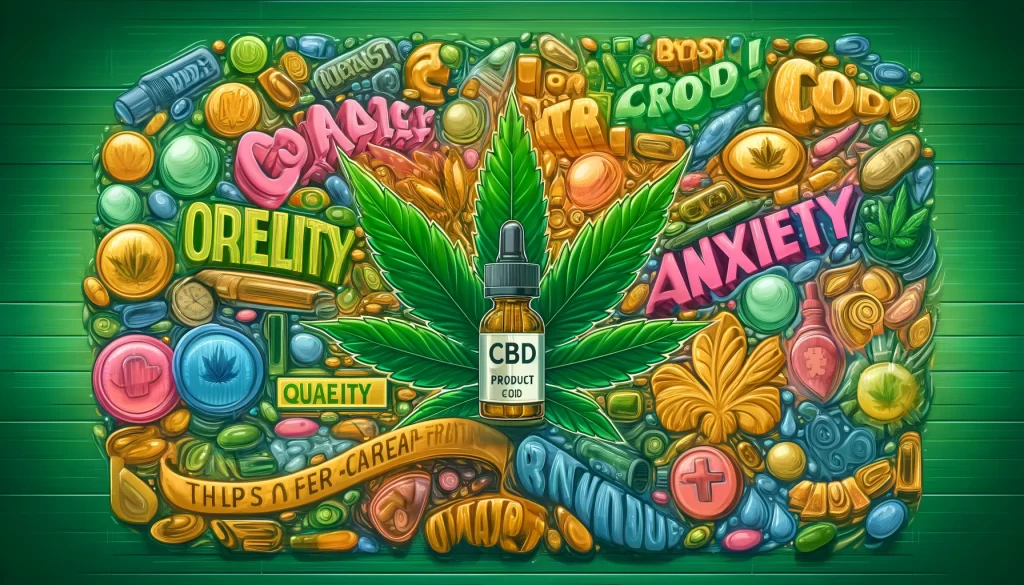
Choosing the right CBD product is crucial for ensuring both efficacy and safety, particularly when using CBD to manage anxiety. The market is saturated with a wide range of CBD products, which can vary significantly in quality and purity. Therefore, it’s important for consumers to be informed and cautious when selecting CBD.
One of the most critical steps in selecting a CBD product is to look for third-party testing. Reputable CBD producers will have their products tested by independent labs to verify the CBD content and to ensure they are free from harmful contaminants such as pesticides, heavy metals, and solvents. These test results, often available as a Certificate of Analysis (COA), should be readily accessible to consumers. The COA provides transparency about what the product contains and whether it meets safety standards.
Another key consideration is the source of the hemp from which the CBD is extracted. High-quality CBD products are typically derived from hemp that is organically grown and harvested in environments that minimize the use of chemicals. This not only supports sustainability but also reduces the risk of chemical residues being present in the final CBD product.
Additionally, understanding the different spectrums of CBD products is important. Full-spectrum CBD contains various cannabinoids and terpenes found in the cannabis plant, which can create an “entourage effect” believed to enhance the therapeutic benefits of CBD. Broad-spectrum CBD offers similar benefits but without THC, whereas CBD isolate is pure CBD, free from other cannabinoids or terpenes.
Finally, consumers should consider the form of CBD that best suits their lifestyle and needs. Whether it’s oils, tinctures, capsules, or edibles, each form has specific benefits and methods of administration. Understanding these can help in making an informed decision that aligns with personal health goals and preferences, ensuring a more targeted and effective approach to managing anxiety with CBD.

Is CBD a miracle solution for anxiety, or just hype? This question has been at the center of much debate as CBD gains prominence in the wellness industry. While there is promising evidence supporting CBD’s efficacy in reducing anxiety symptoms, describing it as a miracle might be an overstatement. Each individual’s experience with CBD can vary significantly, influenced by biological differences, the severity of anxiety symptoms, and personal expectations.
For many, CBD has been a beneficial addition to their anxiety management regimen. Users often report a significant reduction in anxiety symptoms, including less frequent panic attacks, improved sleep patterns, and an overall sense of calm. These anecdotal accounts have fueled the popularity of CBD as a natural alternative to more traditional pharmaceuticals, which can come with heavier side effects.
However, it’s also important to note that CBD is not a cure-all. While some individuals experience considerable benefits, others may find minimal relief. This variability highlights the need for more comprehensive clinical research to better understand who benefits most from CBD and under what conditions.
Moreover, considering CBD as part of a comprehensive treatment plan for anxiety is crucial. Effective anxiety management typically involves a combination of therapies, including psychological counseling, lifestyle changes, and sometimes medication. CBD should be viewed as a potential component of a broader therapeutic strategy rather than a standalone solution.
Ultimately, whether CBD is a miracle or hype depends largely on one’s personal experience and the existing scientific evidence. As research progresses, the understanding of CBD’s place in treating anxiety will become clearer, helping to demystify its role and guide its use in clinical and therapeutic settings.

In conclusion, CBD offers a promising, albeit complex, alternative for those seeking relief from anxiety. While the current research supports its potential benefits, individuals should approach it with an understanding that it may work differently for each person. It’s essential to consider CBD as one part of a comprehensive approach to managing anxiety, integrating it with other proven therapies and lifestyle adjustments.
As the scientific community continues to explore and understand the nuances of CBD for anxiety, those interested in trying CBD should do so with informed caution and in consultation with healthcare professionals. For more details, visit our website.



